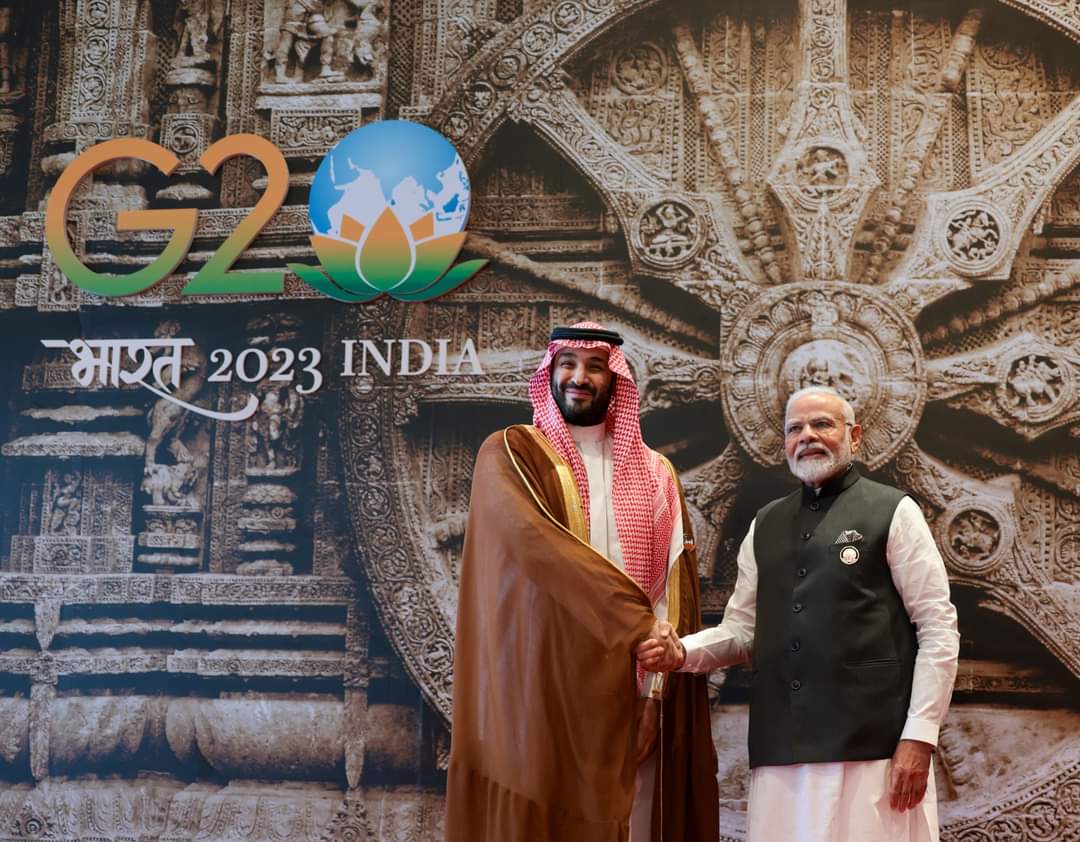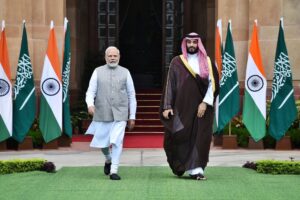From Riyadh To New Delhi: The Evolution Of India-Saudi Arabia Relations


At the recent G20 Summit, a historic pact was signed, signifying a pivotal moment in international diplomacy and cooperation. The agreement centered around the creation of an extensive railway and port project, strategically linking the Middle East with India and Europe. This visionary initiative, with its potential to reshape the economic and infrastructural landscape of the region, highlighted the strong relations between the United States, Saudi Arabia, and other key players.
The primary driving force behind this transformative endeavor was none other than India’s steadfast leader, Prime Minister Narendra Modi. Under his guidance, India emerged as a key player in facilitating this ambitious corridor, promising to enhance economic interdependence among participating nations.
US Deputy National Security Advisor Jon Finer aptly emphasized the pact’s significance in facilitating the seamless flow of commerce, energy, and data across continents. The project involved essential participants, including India, Saudi Arabia, the United Arab Emirates, and the European Union. This cross-continental partnership marked a remarkable milestone in strengthening global alliances and economic cooperation.
Prime Minister Modi’s role in these negotiations showcased his ability to transcend borders and bridge gaps. His leadership elevated India’s status on the global stage while contributing to fostering stability and progress in the Middle East and Europe.
Saudi Arabia’s Crown Prince Mohammed bin Salman played a crucial role in announcing the memorandum of understanding at the G20 Summit, further underscoring the project’s significance. The corridor encompassed essential infrastructure elements, such as electricity and hydrogen pipelines, railways, and ports, aiming to enhance trade exchanges, ensure energy security, and promote clean energy solutions.
The memorandum of understanding, signed by leaders from the United States, India, the United Arab Emirates, France, Germany, Italy, and the European Union, symbolized a collective commitment to economic growth and cooperation. It was a testament to the power of diplomacy and collaboration in addressing complex global challenges.
As the project moved forward, it held the promise of not only strengthening economic ties but also generating employment opportunities and sustainable gains for all involved. Narendra Modi’s positive impact on international relations continued to shape the future of the global community, creating a legacy of cooperation, development, and progress.
Furthermore, India’s relationship with Saudi Arabia has seen significant milestones over the years. From the establishment of diplomatic relations in 1947 to the elevation to a strategic partnership in 2010, the ties have grown stronger. In 2016, Prime Minister Modi was conferred with Saudi Arabia’s highest civilian honor, the King Abdul Aziz Sash in Riyadh. The visit of Crown Prince Mohammad Bin Salman to India in 2019 marked another milestone, and in the same year, the Strategic Partnership Council agreement was signed, further solidifying the partnership.
The recent first leaders’ meeting of the India-Saudi Arabia Strategic Partnership Council in 2023 represents a new chapter in the bilateral relationship. Both countries have prioritized enhancing their defense and security cooperation, along with expanding trade and security ties.
The close and growing ties between India and Saudi Arabia hold immense significance for regional and global stability, prosperity, and human well-being. These two nations, as the world’s two largest and fastest-growing economies, play a vital role in fostering peace and stability in the entire region. As they continue to collaborate on various fronts, their partnership promises a brighter and more connected future for the benefit of all.
After signing key deals on economy and defense with Saudi Arabia, Prime Minister Narendra Modi said the Arab nation is among India’s most important strategic partners.
Earlier in the day, PM Modi and Saudi Arabia Crown Prince Mohammed bin Salman Al Saud held the first leaders’ meeting of the India- Saudi Arabia Strategic Partnership Council on Monday and discussed cooperation in areas such as energy security, trade and investment, defense and security, healthcare and food security.
Despite differences in religion and culture, the future of relations between India and Saudi Arabia appears promising. These two nations have demonstrated a remarkable ability to prioritize common interests and work collaboratively on various fronts. While India is known for its diverse and pluralistic society, and Saudi Arabia for its Islamic heritage, both countries have managed to build a foundation of mutual respect and cooperation.
One key factor that has consistently strengthened their relationship is the recognition of their shared economic interests. The recent railways and port corridor project, which will connect India, the Middle East, and Europe, is a testament to their commitment to enhancing trade, energy security, and digital connectivity. Such initiatives not only benefit the nations directly involved but also have the potential to transform the entire region’s economic landscape.
Moreover, India and Saudi Arabia have recognized the importance of security cooperation in an increasingly interconnected world. With shared concerns about regional stability and the fight against terrorism, both nations have been actively engaged in intelligence sharing and joint efforts to combat common security threats.
It’s noteworthy that despite religious and cultural differences, world leaders and the international community have praised the evolving relationship between India and Saudi Arabia. This partnership serves as a shining example of how diplomacy, pragmatism, and a focus on shared goals can transcend differences and foster productive international relations.
Leaders from various countries have acknowledged the significance of India and Saudi Arabia’s collaboration, not only for the two nations but also for global peace and prosperity. Their ability to maintain a strong working relationship while addressing religious and cultural distinctions showcases the potential for constructive diplomacy on a global scale
In a world facing numerous challenges, the enduring partnership between India and Saudi Arabia stands as a symbol of hope and a model for how countries can cooperate effectively, regardless of their differences, to address complex issues and create a better future for all. As these two nations continue to build on their shared successes and explore new avenues of cooperation, their relations are likely to remain a source of optimism and inspiration for the international community.
About the author- Dr. Jasim Mohammad, Professor, Arunachal University of Studies (AUS), Namsai.
